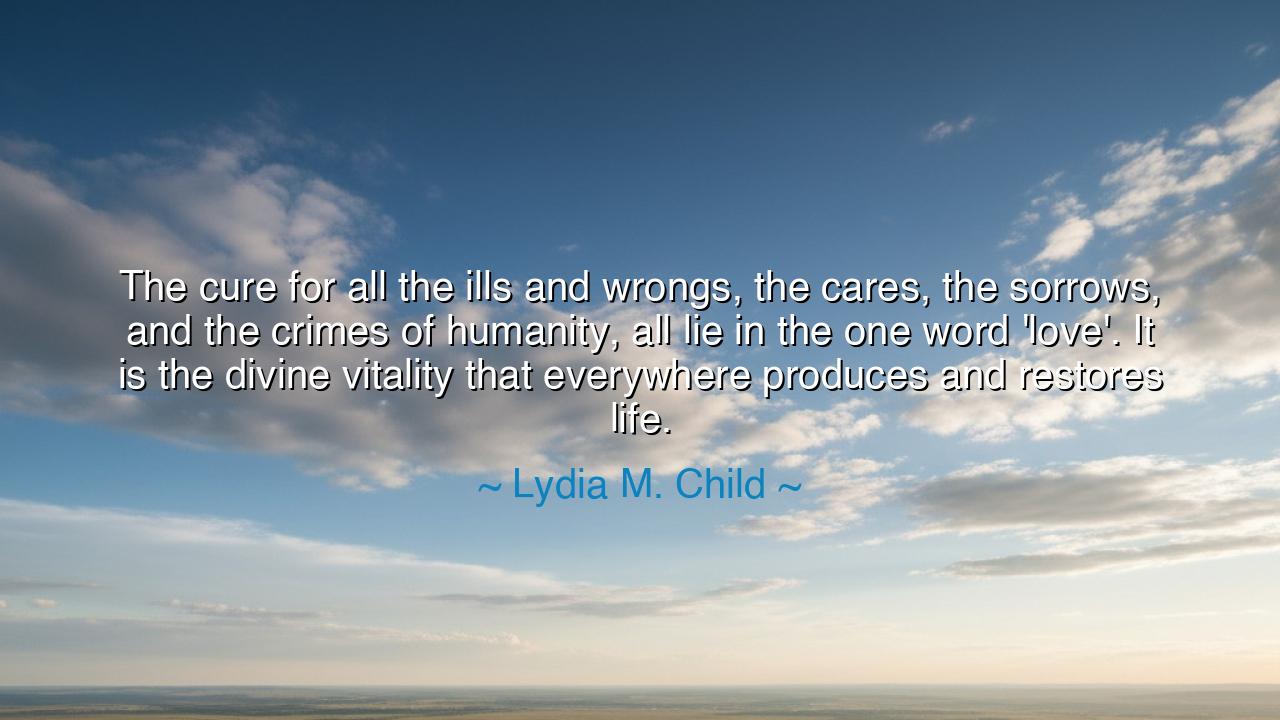
The cure for all the ills and wrongs, the cares, the sorrows, and
The cure for all the ills and wrongs, the cares, the sorrows, and the crimes of humanity, all lie in the one word 'love'. It is the divine vitality that everywhere produces and restores life.






When Lydia Maria Child wrote, “The cure for all the ills and wrongs, the cares, the sorrows, and the crimes of humanity, all lie in the one word ‘love’. It is the divine vitality that everywhere produces and restores life,” she spoke as both a reformer and a prophet. Born in an age of turmoil and division, Child was not naïve to the world’s cruelty — she had seen slavery, injustice, and poverty firsthand. Yet from the depths of this awareness came her conviction that only love possesses the power to heal what hatred and fear have broken. Her words are both a plea and a revelation: that beneath every social evil, every personal grief, lies the absence of love — and in its return, the rebirth of life itself.
To understand love as Child meant it, one must see beyond sentiment. She spoke of love not as fleeting emotion but as divine vitality — a spiritual force, the very breath of creation. It is the energy that moves the stars, the pulse that animates every living thing, the light that renews even what has fallen into darkness. In this sense, love is not merely the cure for moral decay; it is the origin of moral strength. When love rules the heart, cruelty becomes impossible, deceit unthinkable, and despair powerless. Love is not weakness; it is life’s greatest power, the creative essence of existence itself.
The ancients, too, recognized this sacred truth. The Greeks called it Agape, the selfless, godlike love that holds the universe together. The Hindus spoke of Ahimsa, the principle of non-harm born from universal compassion. Christ himself proclaimed that the highest law is to “love thy neighbor as thyself.” All these teachings converge on the same eternal truth Child expressed: that love alone can restore life — to individuals, to nations, to the human spirit itself. For where there is love, there is empathy; where there is empathy, there is understanding; and where there is understanding, there can be no hatred.
History bears witness to this truth. Consider Mahatma Gandhi, who transformed a nation’s bondage into freedom not through war, but through love — love so fierce that it refused to return violence with violence. Or Martin Luther King Jr., who preached that “hate cannot drive out hate; only love can do that.” These leaders drew upon the same divine vitality Child spoke of. Their movements were not acts of politics alone, but manifestations of redemptive love — a force that breaks chains without breaking spirits, that heals oppressor and oppressed alike. Love, in their hands, became both a weapon and a balm.
But love’s healing is not only for nations; it is for the soul itself. Bitterness, guilt, resentment — these are the prisons of the heart. When one chooses love — through forgiveness, compassion, or simple kindness — the locks begin to break. Love restores what fear destroys. It reconnects us to our own humanity. As Child wrote, love “produces and restores life,” for it rekindles in us the will to grow, to reach toward the light again, even after deep sorrow. It is as if love contains within it the seed of resurrection — not only for people, but for the world.
And yet, love is not an easy cure. It demands courage — the courage to feel deeply, to forgive freely, to act selflessly. To love in a world that teaches cynicism is to live as a rebel of the spirit. But those who dare to love become healers, even without knowing it. Their compassion ripples outward, touching lives they will never see. Every act of love, however small, participates in the restoration of life. A gentle word, an act of mercy, a hand extended to one who has fallen — these are the sparks by which the divine vitality spreads.
So, my child, heed this ancient and immortal wisdom: choose love always. When wronged, answer with compassion; when faced with cruelty, answer with grace. Let your love not be timid, but fierce — not selective, but boundless. Love is not the absence of strength; it is the transformation of strength into creation. It is the force that renews what the world destroys.
Thus, as Lydia Maria Child reminds us, “The cure for all the ills and wrongs, the cares, the sorrows, and the crimes of humanity, all lie in the one word ‘love.’” It is not a dream but a law of life itself — that only love heals, only love endures, only love creates. Where love is, the soul is free, and where the soul is free, the world itself begins to bloom again.






AAdministratorAdministrator
Welcome, honored guests. Please leave a comment, we will respond soon